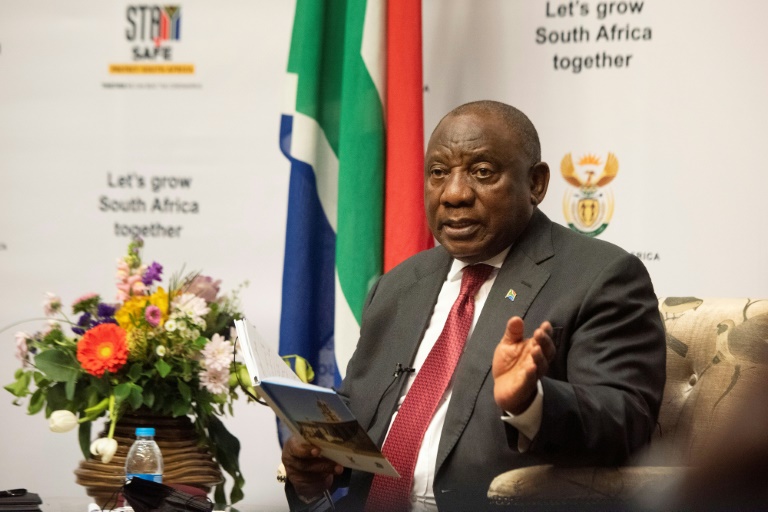S.Africa’s Ramaphosa should have acted against graft under Zuma: report

President Ramaphosa described the corruption as an ‘assault on our democracy’
Johannesburg – The last damning findings of a four-year probe into state corruption in South Africa under ex-leader Jacob Zuma, published Wednesday, suggested that President Ramaphosa could have acted against some of the allegations against his predecessor.
Receiving the report Ramaphosa, who was then deputy to Zuma, described the graft as an “assault on our democracy”.
The report was handed to Ramaphosa at his Pretoria offices by the head of the investigating panel and chief justice, Raymond Zondo.
The pillaging and mismanagement of South Africa’s state-owned enterprises during Zuma’s nine years in office, when Ramaphosa was his deputy, has been dubbed “state capture”.
In all, it took more than 400 days for an investigating panel to collect testimonies from around 300 witnesses, including Ramaphosa.
Ramaphosa’s answers to some questions about what he knew of the corrupt activities were “opaque” and “unfortunately leave some important gaps”, the report said.
And whether he could have acted to curb the graft, “the wealth of evidence before this commission suggests that the answer is yes”, it said.
“There was surely enough credible information in the public domain… to at least prompt him to inquire and perhaps act on a number of serious allegations.
“As the Deputy President, he surely had the responsibility to do so.”
Ramaphosa did not immediately respond to the contents of the report, but said it “provides us with an opportunity to make a decisive break with the era of state capture”.
“State capture really was an assault on our democracy, it violated the rights of every man, woman and child in this country.”
The investigation was triggered by a 2016 report by the then corruption ombudswoman.
More than 1,430 individuals and institutions, including Zuma, were implicated. Zuma has previously denied any wrongdoing.
Ramaphosa now has four months to act on the panel’s recommendations.
The first volume of the report was published in January, and now the complete document runs to more than 5,600 pages.
The report described Zuma as a “critical player” in the high-level plunder of state-owned enterprises that dogged his nine-year tenure, which ended unceremoniously in 2018 when he was forced to resign.
Zuma was last year slapped with a 15-month jail term for refusing to testify before the investigators.
He was granted parole just two months into his incarceration, but not before his jailing sparked riots last July that left more than 350 people dead.
– ‘Looting scheme’ –
The panel said “Zuma fled the commission because he knew there were questions” he would fail to answer, as it singled out his ally and ex-chairwoman of the struggling national carrier South African Airlines (SAA) of running down the airline.
The investigations revealed how Zuma’s friends, the wealthy Indian-born Gupta brothers, became enmeshed at the highest levels of government and the ruling African National Congress, including influencing ministerial appointments under Zuma.
Two of the three Gupta tycoons were arrested in Dubai earlier this month and face extradition to South Africa to face trial.
“The natural conclusion is that, during this period… the ANC under president Zuma, permitted, supported and enabled corruption and state capture,” said the report.
Taking over after Zuma was forced to resign over corruption, Ramaphosa came into office declaring anti-graft fight a priority of his administration.
Ramaphosa in 2019 estimated that corruption, could have cost South Africa around 500-billion-rand ($31.4-million), then an amount equivalent to about a tenth of the GDP of Africa’s most industrialised economy.
The publication of the final report comes as Ramaphosa is himself embroiled in a scandal following a robbery at his luxury game and cattle farm two years ago.
A former spy chief Arthur Fraser accused him of corruption alleging he hid millions of dollars in cash inside couches, and that he bribed the robbers to avoid scrutiny for keeping large sums of cash at home.
The scandal risks derailing Ramaphosa’s bid for a second term as ANC president ahead of the 2024 general election. He says he is a victim of “dirty tricks” and “intimidation” from those against his anti-graft fight.
